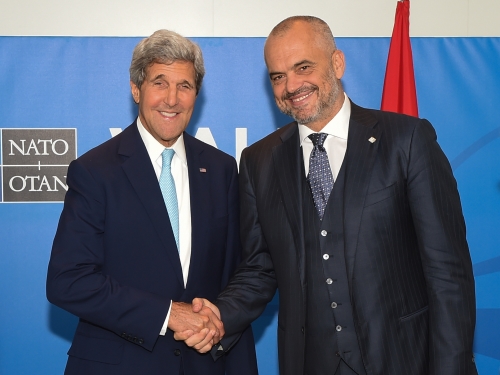
This article was originally published by Atlantic-Community.org on February 23, 2015.
Since the late 1990s, the NATO alliance has experienced three distinct phases of enlargement: in March 1999, March 2004 and April 2009. Some security experts have taken a rather cynical view of this process, arguing that NATO’s eastward expansion was a factor in causing the current instabilities in the Ukraine. In fact, this analysis has proven to be very weak as it does not consider the efforts the alliance made to build a real dialogue with Russia over the course of 20 years. These individuals would equally want to be reminded of the so-called ‘dual-track approach’ to NATO enlargement, launched in the 1990s. This meant that any possible enlargement of NATO would have to go hand-in-hand with the formulation of a strategic partnership with the Russian Federation. This was the basis for the 1997 NATO-Russia Founding Act and was a coherent part in the setting up of the NATO-Russia Council in 2002.
These shaky interpretations do not take into account the sovereign right of such nations in the Visegrád Group and Baltic States to choose their security partners after 1989 and 1991 respectively. The establishment of relations between the alliance and the states in these regions in the early 1990s brought about many positive developments which the critics of NATO enlargement have always chosen to ignore. The Partnership for Peace Programme, established 21 years ago, proved to be an essential component in the modernisation and interoperability of these states armies. This allowed for their formal inclusion in the early years of NATO operations in Bosnia, preparing them for the commitments and obligations of NATO membership. Russia was not left on the sidelines. Instead, it was encouraged by the alliance and other institutions to play an active part in the building of this new European security order in the years after 1989. These issues cannot be disputed and the critics would need to re-engage with reliable literature assessing how this process evolved in the 1990s and in the years running up to 2014.
It is for these reasons that the fourth phase of NATO’s enlargement should occur for a third time in the Western Balkans. As of 2015, Albania, Croatia and Slovenia are formal members of NATO. Why, therefore, should Montenegro and Macedonia not be the next states to join the alliance from this region? Macedonia has been waiting for almost two decades to join NATO, even though it was an early PfP member and has proven to be a steadfast partner where a variety of NATO operations are concerned. The country was not directly affected by Yugoslavia’s violent disintegration in the 1990s and avoided a destructive civil war in 2001. It has made great efforts to build its economic and political institutions over the last decade and is currently facing some political difficulties, but these issues will hopefully be resolved through constructive dialogue.
The ongoing dispute with Greece over the country’s official name has prevented Macedonia from becoming a formal member of the EU and NATO and there equally needs to be a solution to this chronic problem. In the case of Montenegro, the country has made great strides in military and institutional reforms over the last number of years. These successes were recognised by the Danish General Knud Bartels, the current Chairman of NATO’s Military Committee, during a visit to the country in late October 2014. The country has also benefited from the wise leadership of Milo Ðukanović during his terms as President and Prime Minister over the course of two decades. A former ally of Slobodan Milošević, Ðukanović broke with the Serbian dictator in the late 1990s and played a dominant role in leading his country to eventual independence in the summer of 2006.
In conclusion, the positive developments that have arisen from the different phases of NATO’s enlargement need to be acknowledged. The events in the Ukraine should not slow down this process, with the next round incorporating Macedonia and Montenegro.
Dr. Niall Mulchinock is currently working as a lecturer in international relations within the Department of Government at University College Cork in Ireland. Dr. Mulchinock completed his PhD in 2012.
For more information on issues and events that shape our world, please visit ISN Security Watch or browse our resources.

